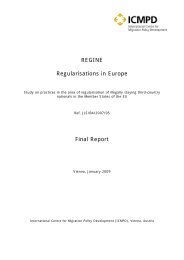taxud/2414/08 - European Commission - Europa
taxud/2414/08 - European Commission - Europa
taxud/2414/08 - European Commission - Europa
You also want an ePaper? Increase the reach of your titles
YUMPU automatically turns print PDFs into web optimized ePapers that Google loves.
exchange (drafts), checks, and certificates of deposit where not covered by a preceding<br />
definitions of exempt services;<br />
(d) Euro debt securities: Euro debt securities come under the definition of exempt<br />
securities; Euro debt securities are securities issued internationally outside their domestic<br />
market in a denomination different from that of the issuer's domicile. They include<br />
Eurobonds and Euronotes. Eurobonds are characteristically underwritten, and not<br />
secured, and interest is paid gross. A Euronote may take the form of Euro-commercial<br />
paper (ECP) or Euro-certificates of deposit.<br />
(3) hybrid securities, including preference shares, equity warrants, convertible<br />
instruments in the form of bonds or preferred stock which may be converted into<br />
the common stock of the issuing company;<br />
Hybrid securities combine characteristics of equity and debt securities; they exist in a<br />
variety of forms:<br />
(a) Preference shares: Preference shares form an intermediate class of security<br />
between equities and debt. If the issuer is liquidated, they carry the right to receive<br />
interest and/or a return of capital in priority to ordinary shareholders. However, from a<br />
legal perspective, they are capital stock and therefore may entitle holders to some degree<br />
of control depending on whether they contain voting rights;<br />
(b) Convertibles: Convertibles are bonds or preferred stock which can be converted,<br />
at the election of the holder of the convertibles, into the common stock of the issuing<br />
company. The convertibility, however, may be forced if the convertible is a callable<br />
bond, and the issuer calls the bond. The bondholder has, for example, about 1 month to<br />
convert it, or the company will call the bond by giving the holder the call price, which<br />
may be less than the value of the converted stock. This is referred to as a forced<br />
conversion;<br />
(c) Equity warrants: Equity warrants are options issued by the company which allow<br />
the holder of the warrant to purchase a specific number of shares at a specified price<br />
within a specified time. They are often issued together with bonds or existing equities,<br />
and are, sometimes, detachable from them and separately tradable. When the holder of<br />
the warrant exercises it, he pays the money directly to the company, and the company<br />
issues new shares to holder. Warrants, like other convertible securities, increases the<br />
number of shares outstanding, and are usually accounted for in financial reports as fully<br />
diluted earnings per share, which assumes that all warrants and convertibles will be<br />
exercised.<br />
(4) instruments recording unit ownership in undertakings for collective investment<br />
such as open and closed-ended funds, exchange traded funds, mutual and<br />
pension funds, hedge funds and real estate investment funds.<br />
33
















